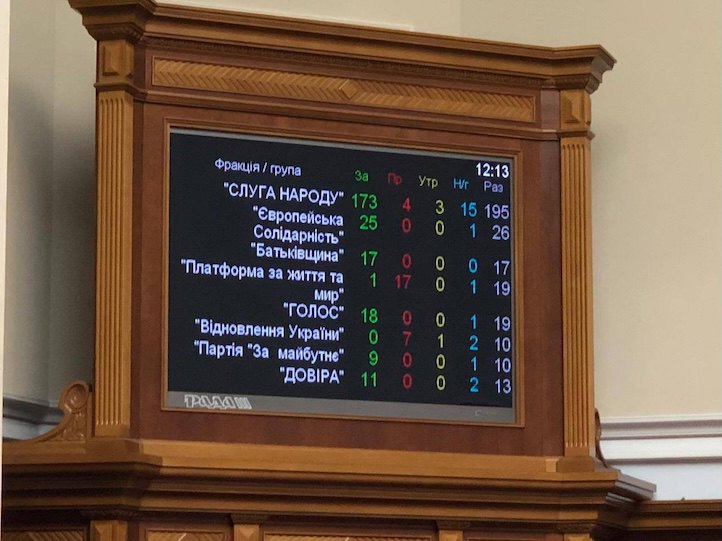The Verkhovna Rada banned the activities of the Ukrainian Orthodox Church of the Moscow Patriarchate. The decision was made without discussion.
The vote was cast by 269 MPs, two more than the number of those who supported it in the first reading. MP Oleksiy Honcharenko announced the adoption of the law.
Initially, there were 265 votes, but then Honcharenko, Maryana Bezuhla, Serhiy Ionoshus and Nataliya Pipa asked that their votes be counted as well, because there was a malfunction. Honcharenko also published a list of MPs from all factions who did not support the ban.
His colleague Yaroslav Zheleznyak clarified that 29 MPs pressed the red buttons, while four abstained. By faction: ‘Servant of the People’ - four against, three abstained, ‘Eurosolidarity’ - all in favour, ‘ Batkivshchyna’ - all in favour, ‘Holos’ - all in favour, ‘Dovira’ - all in favour, former OPFL, i.e. ‘Platform for Life and Peace’ - 17 against, and ‘Restoration of Ukraine’ - seven against, one abstained, non-factional - one against, ‘For the Future’ - all in favour.
The ban on organisations associated with the Russian Orthodox Church will not be a one-time event, and decisions will be made on a case-by-case basis. A special service, upon request from citizens or authorities, will investigate whether a particular church is affiliated with the Russian Orthodox Church. If so, it will issue an order to break the connection, and if the church complies, it will not be deregistered. If not, the court will decide whether to ban its activities. Each church will have nine months to sever ties with the ROC.

MP Yaroslav Zheleznyak explained that the adopted draft law imposes restrictions on religious organisations on ties with the Russian Orthodox Church, whose activities are prohibited in Ukraine, defines what is meant by such ties, provides a time limit within which Ukrainian organisations must get rid of these ties (nine months), defines the procedure for state supervision over compliance with this requirement, and gives state authorities the authority to interact with religious organisations that were unable or unwilling to comply with the requirements of the law.
After the outbreak of full-scale war, the issue of the Russian Church in Ukraine became particularly acute. There were frequent cases of hostile propaganda spread in the churches of the UOC-MP, and even of clergymen working for Russian special services and passing information about the Defence Forces to enemy troops.
The SBU came to the UOC (MP) facilities with inspections. The service explained that this was not religious persecution, but counterintelligence measures. In December 2022, the National Security and Defence Council decided to impose sanctions against the MP clergy who collaborated with the aggressor. The NSDC also initiated a ban on religious organisations affiliated with Russia after numerous cases of Kremlin propaganda materials being found at UOC facilities and anti-Ukrainian narratives being spread among believers.
The public demand for a ban on religious organisations affiliated with the aggressor country was evidenced by polls and the widespread banning of UOC (MP) branches at the regional level.
On 1 December 2022, President Volodymyr Zelenskyy enacted the decision of the National Security and Defence Council to ban the activities of religious organisations affiliated with centres of influence in Russia in Ukraine. The Cabinet of Ministers submitted the bill to the Verkhovna Rada on 19 January 2023, and MPs were expected to submit it for consideration in May. However, on 23 September, Speaker Ruslan Stefanchuk said that there were no votes to ban the UOC-MP - ‘there is an internal discussion’.
What exactly was the ‘internal discussion’ and which MPs are against it - read in the article by Sonya Koshkina ‘Is the ban on the UOC-MP postponed? ‘Servants are against it’.
In August, MPs began collecting signatures under an appeal to Parliament Speaker Ruslan Stefanchuk demanding that he submit bills that would help ban the activities of the Moscow Patriarchate in Ukraine.
On 19 October 2023, the Verkhovna Rada voted to ban the UOC-MP in the first reading.
After that, the leaders of the Servants and the former OPFL asked Stefanchuk to send the ‘law banning the UOC-MP’ to the Venice Commission.
The document was supposed to be adopted in the second reading on the anniversary of Russia's full-scale invasion, but failed.
In May 2024, MPs agreed that in June they would consider the bill banning the UOC-MP in the second reading. The agreement was reached after the opposition blocked the rostrum. The conciliation board agreed not to create a single list to collect signatures for the bill. At first, the factions collected signatures separately, and then they were to be combined into one list so that it was clear whether there would be enough votes in the parliament. More than 140 MPs did not sign in support of the bill at the time. As of July, more than 60 MPs from the Servant of the People party had not signed in support of the bill to ban the UOC-MP and did not intend to support it in the second reading.
On 23 July, MPs from different factions blocked the rostrum demanding that the ban on the Russian church be considered. The MPs said that they would not consider any other draft law, except for the military one, before this vote. Parliament did not meet in the session hall for almost a month.
On 10 August, President Volodymyr Zelenskyy announced that a decision was being prepared that would ‘strengthen our Ukrainian spiritual independence’.
August 15 Metropolitan Epifaniy of Kyiv and All Ukraine, head of the Orthodox Church of Ukraine (OCU), calls on Metropolitan Onufriy, head of the UOC (MP), and all the clergy of the church to engage in a dialogue on unity.
On 16 August, the Committee on Humanitarian and Information Policy supported amendments to the final version of the draft law banning the UOC (MP) (draft law 8371).







